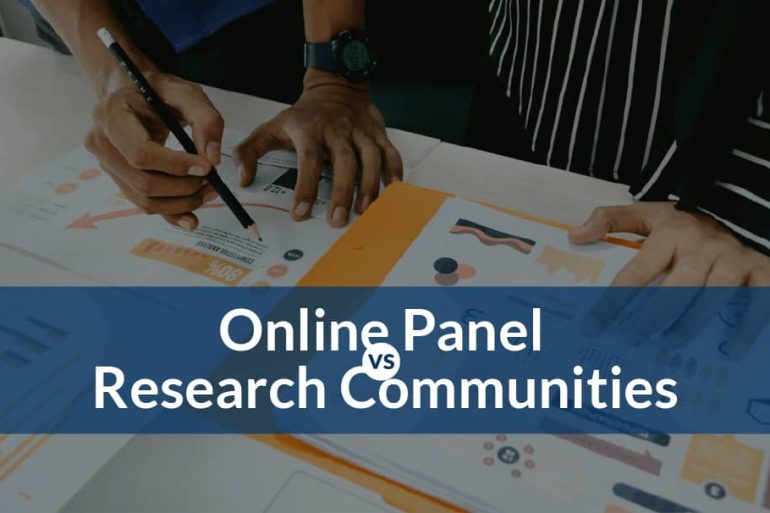The Key Difference Between Online Panel And Research Communities

Teamarcs is a leading technology company in market research that helps market research companies drive their research survey forward by offering intelligent connections of technologies and market research expertise. We are often asked, “what is the difference between online panel and research communities”. Online research communities and online panels are basically two different types of research methods that can be used to gather data from participants. While online panels are commonly used in market research, online research communities have recently emerged as more powerful and effective tools for researchers.
What is an Online Panel?
An online panel is a large, pre-screened group of people who have agreed to participate in research activities, typically surveys. Panel members are recruited through various means, including online advertising and invitations sent to their email addresses. Once they’ve registered their interest in taking part in research, they can be contacted quickly and easily by the researcher when a new study is being launched.
Why use an Online Panel?
There are many reasons why you might want to use an online panel for your research needs:
Speed: Recruiting participants for studies can be time-consuming. An online panel allows you to access a large number of potential respondents quickly and easily. This can be especially useful when you need to survey a large number of people or if you are conducting research on a very specific subgroup of the population.
Control: Online panels are highly-convenient too, allowing you to participate in surveys wherever and whenever it suits you.
Accuracy: When using an online panel, your data is more accurate thanks to the demographic profiling that most companies carry out before adding members to their panels. This means only those who match your desired age group, location, etc will be invited to complete your survey – meaning data collection is targeted towards your target respondents with minimum waste.
Reach: Online panels often provide access to hard-to-reach groups such as teenagers, retired people and rural residents.
What is an Online Research Community?
An online research community is a group of people who are interested in sharing ideas about topics or issues. Community members are individuals who have actively expressed an interest in participating in research activities by expressing, through various means, their willingness to share and discuss ideas related to the topic. Community members may have been recruited through invitations sent to email addresses or interactions on social media channels. Once they’ve declared their interests, users can then be contacted quickly and easily.

Why use an Online Research Community?
There are many reasons why you might want to use an online research community for your research needs:
Transparency: Online communities are more transparent than offline groups as discussions are public by default, enabling greater collection of rich data.
Flexibility: Online communities can be accessed anywhere and anytime as long as there is connectivity. This allows for studies covering a wide variety of topics to be conducted with participants from across the globe.
Replicability: Participants within an online community are more likely to answer surveys or engage in discussions if they feel like others will benefit from their input and learnings – i.e., they can gain insights by seeing others’ responses, and potentially explore new ideas that they may not have come up with on their own.
Engagement: As mentioned above, those who join online panels tend to be more engaged than those recruited through traditional offline methods such as telephone interviews. They’re also more likely to respond to surveys and complete other research tasks.
The Core Difference Between Online Panel and Research Communities
The difference between online panel and research communities is that members in a research community are completely free to discuss topics, whereas members of an online panel are recruited by invitation.
Reach: Online research communities offer researchers the ability to reach out to participants from around the globe. Because communities are open to anyone who wants to join, researchers can tap into a large pool of potential respondents from anywhere in the world. This is especially beneficial for studies that require international participation.
Engagement: In online communities, members are typically more engaged than those in online panels. Community members are encouraged to take part in discussions and share their opinions on a variety of topics – something that online panels fail to replicate. The result is that researchers can gain richer and more insightful data from communities than they would from panels.
Flexibility: Communities offer researchers flexibility in terms of study design and questionnaire development. Researchers are not limited to recruiting participants through pre-determined questions or surveys but can develop open-ended questions that allow for a more organic exchange of ideas between participants. Additionally, community moderators can help to guide conversations and ensure that discussions remain on-topic. This dynamic may be difficult to achieve in online panels, which are often created for specific research projects and do not change based on the study at hand.
Transparency: Participating communities are open to anyone who wants to join, regardless of their demographics or characteristics. As a result, researchers can tap into a broad spectrum of respondents without worrying about ‘contamination’ i.e., recruiting participants outside their target population (which is impossible when using offline methods). Additionally, community moderators can help to ensure that conversations remain productive and appropriate for all audiences.
Motivation: Community members within an online panel may leave if the incentives offered are too low or they feel like there’s enough time given to complete surveys. This is often not the case in research communities, where members are motivated to participate because they want to contribute to discussions and share their insights with others.
Duration: Communities can be used for short-term or long-term studies, whereas panels are typically used for short-term studies only. This is because community members are more likely to remain engaged over an extended period of time, whereas panel members may become disengaged if they are not regularly contacted or given new surveys to complete.
How do I get started?
Online Panels- The use of online panels has exploded in recent years as researchers have come to appreciate their many benefits. If you’re looking for a large, pre-screened group of participants who are ready and willing to take part in your surveys, then an online panel is the perfect solution!
Research Community- There are many reasons why researchers might want to consider using online research communities as a data collection method. Communities offer transparency, flexibility, accuracy, reach, and engagement that is hard to replicate with other methods.
Teamarcs – A Next-Generation Leading Technology Company
Boost your business to the next level with the best in class next generation Panel Management Platform “Survey Cliq”. Panel management platform comes with advanced and extensive features that can smartly manage your community members and offer them a great experience. Our robust and fully automated panel management software offers effective invitation and signup options and geolocation tracking of each panelist. Also, it comes with complex logic and branching features that can be used to collect more relevant information from the user community. Harness our most powerful platform today.
- Why must you use an online market research panel?
- What Is An Online Panel And Why It Matters?
- 5 Advantages of Custom Online Panel Research
- How To Build An Efficient And Quality Panel For Conducting Research?
- Evolution of Research Panel and Panel Management
- Which features you should have in your Online Research Panel?
- Benefits of using Quality Online Research Panel
- How To Prevent Fraud In Custom Online Panel Research?